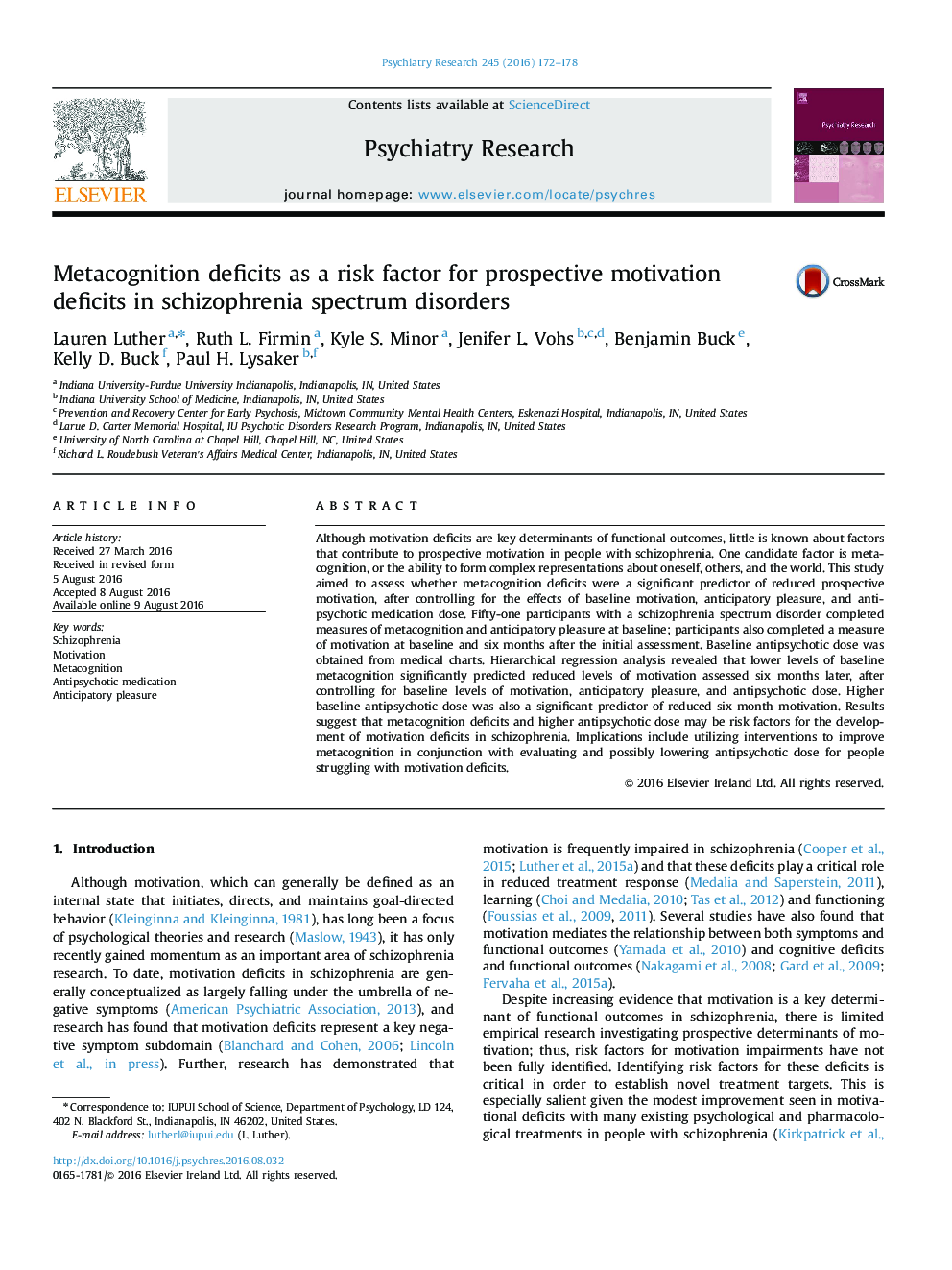| کد مقاله | کد نشریه | سال انتشار | مقاله انگلیسی | نسخه تمام متن |
|---|---|---|---|---|
| 6812356 | 1433801 | 2016 | 7 صفحه PDF | دانلود رایگان |
عنوان انگلیسی مقاله ISI
Metacognition deficits as a risk factor for prospective motivation deficits in schizophrenia spectrum disorders
ترجمه فارسی عنوان
کمبود شناختی به عنوان یک عامل خطر برای نقایص انگیزشی آینده در اختلالات طیف اسکیزوفرنی
دانلود مقاله + سفارش ترجمه
دانلود مقاله ISI انگلیسی
رایگان برای ایرانیان
کلمات کلیدی
جنون جوانی، انگیزه، فراشناخت، داروهای ضد روانپزشکی، لذت پیش بینی کننده،
ترجمه چکیده
اگرچه نقایص انگیزشی عوامل تعیین کننده نتایج حاصل از عملکرد است، اما در مورد عوامل موثر بر انگیزه آینده در افراد مبتلا به اسکیزوفرنیا کم است. یکی از عوامل نامزدی، فراشناخت یا توانایی شکل دادن ادبیات پیچیده در مورد خود، دیگران و جهان است. این مطالعه با هدف بررسی اینکه آیا نقص های فراشناختی پیش بینی کننده موثر انگیزه آینده نگر است، پس از کنترل اثرات انگیزه پایه، لذت پیشگویی و دوز داروهای ضد روان پریشی. پنجاه و یک شرکتکننده با اختلال طیف اسکیزوفرنی، اقدامات فراشناختی و لذت پیشگویی را در ابتدای مرحله انجام داد. شرکتکنندگان همچنین یک انگیزه را در مرحله پایانی و شش ماه پس از ارزیابی اولیه تکمیل کردند. دوز آنتی سایکوتیک پایه از نمودارهای پزشکی بدست آمد. تجزیه و تحلیل رگرسیون سلسله مراتبی نشان داد که سطوح پایین فرآیند شناخت اولیه، مقادیر پایین انگیزه ای را که شش ماه بعد مورد ارزیابی قرار گرفت، پس از کنترل سطوح ابتدایی انگیزش، لذت پیشگویی و دوز آنتی سایکوتیک، پیش بینی کرد. دوز آنتیس سایکوتیک مبتنی بر بالا نیز پیش بینی قابل توجهی از کاهش انگیزه شش ماهه بود. نتایج نشان می دهد که کمبود فراشناختی و دوز آنتی سایکوتیک بالاتر ممکن است عامل خطر برای توسعه کمبود انگیزه در اسکیزوفرنیا باشند. پیامدهای شامل استفاده از مداخلات برای بهبود فراشناخت در ارتباط با ارزیابی و احتمالا کاهش دوز ضدپرسی برای افرادی است که با کمبود انگیزه مواجه هستند.
موضوعات مرتبط
علوم زیستی و بیوفناوری
علم عصب شناسی
روانپزشکی بیولوژیکی
چکیده انگلیسی
Although motivation deficits are key determinants of functional outcomes, little is known about factors that contribute to prospective motivation in people with schizophrenia. One candidate factor is metacognition, or the ability to form complex representations about oneself, others, and the world. This study aimed to assess whether metacognition deficits were a significant predictor of reduced prospective motivation, after controlling for the effects of baseline motivation, anticipatory pleasure, and antipsychotic medication dose. Fifty-one participants with a schizophrenia spectrum disorder completed measures of metacognition and anticipatory pleasure at baseline; participants also completed a measure of motivation at baseline and six months after the initial assessment. Baseline antipsychotic dose was obtained from medical charts. Hierarchical regression analysis revealed that lower levels of baseline metacognition significantly predicted reduced levels of motivation assessed six months later, after controlling for baseline levels of motivation, anticipatory pleasure, and antipsychotic dose. Higher baseline antipsychotic dose was also a significant predictor of reduced six month motivation. Results suggest that metacognition deficits and higher antipsychotic dose may be risk factors for the development of motivation deficits in schizophrenia. Implications include utilizing interventions to improve metacognition in conjunction with evaluating and possibly lowering antipsychotic dose for people struggling with motivation deficits.
ناشر
Database: Elsevier - ScienceDirect (ساینس دایرکت)
Journal: Psychiatry Research - Volume 245, 30 November 2016, Pages 172-178
Journal: Psychiatry Research - Volume 245, 30 November 2016, Pages 172-178
نویسندگان
Lauren Luther, Ruth L. Firmin, Kyle S. Minor, Jenifer L. Vohs, Benjamin Buck, Kelly D. Buck, Paul H. Lysaker,
